-
-
List of Articles
-
Open Access Article
1 - Investigating the Low Growth Factors of Practical Wisdom in Islamic Philosophy from Ibn Sina to Mulla Sadra (With Emphasis on Ethics)
Mohammad Reza Asadi Gholamreza Badr,khani -
Open Access Article
2 - The nature and truth of amnesty from the perspective of the Qur'an and narrations
Mohammad Ali Jahdi Kamandar Sharif,of -
Open Access Article
3 - The Principles of the Epistemology of the Rule of Law in the Legal System of Iran
سید محمد علی آل محمد Godrat,o Allah Noruzy manoochehr Tavassol Naini, -
Open Access Article
4 - Anthropology from the perspective ibn sina
masome alvandiyan Ali alah behdashti -
Open Access Article
5 - Structuralism and roots of terrorism in Pakistan
mahdi imani keyhan bazegar -
Open Access Article
6 - Analysis of different opinions of commentators on the word "Araf" in the Quran
Mohammad Badreh Mohammad Ali Rezaei Kermani Nasabpur Mohammad Hasan Rostami -
Open Access Article
7 - Investigating the Relationship between Religion and Ethics from the Viewpoint of Islamic and Western Scientists
Nasrin Tavakoli -
Open Access Article
8 - Pathology of Demand and Spiritual Desire in Khorasani Style Poetry
Nazi Sang Sefidi Ebrahim Estagi Ali Eshghi Sardehi -
Open Access Article
9 - Studying the constitutional and legal nature of individualism or individuality Authenticity
Somayyeh Sarami Nafiseh Nekouie Mehr -
Open Access Article
10 - The discourse of the quran in order to fight hoard
Masoumeh Mirzajani Bijar,pasi Roghayyeh Sadeghi Nayyeri Alireza Abdul,Rahimi -
Open Access Article
11 - Differences of Ebn Arabi and Josef Murphy in the issue of miracle
mohammad Ali vosooghian najafAbady Mohammad Amiri Ata mohammad rad manesh -
Open Access Article
12 - The philosophy of controversy Controversy of the Prohibition of the Writing of the Prophetic Hadith in the First Century
morteza darabi jafar taban -
Open Access Article
13 - Criticism in the liberation theology of Iqbal Lahori
Azizollah Salari
-
The rights to this website are owned by the Raimag Press Management System.
Copyright © 2017-2026







